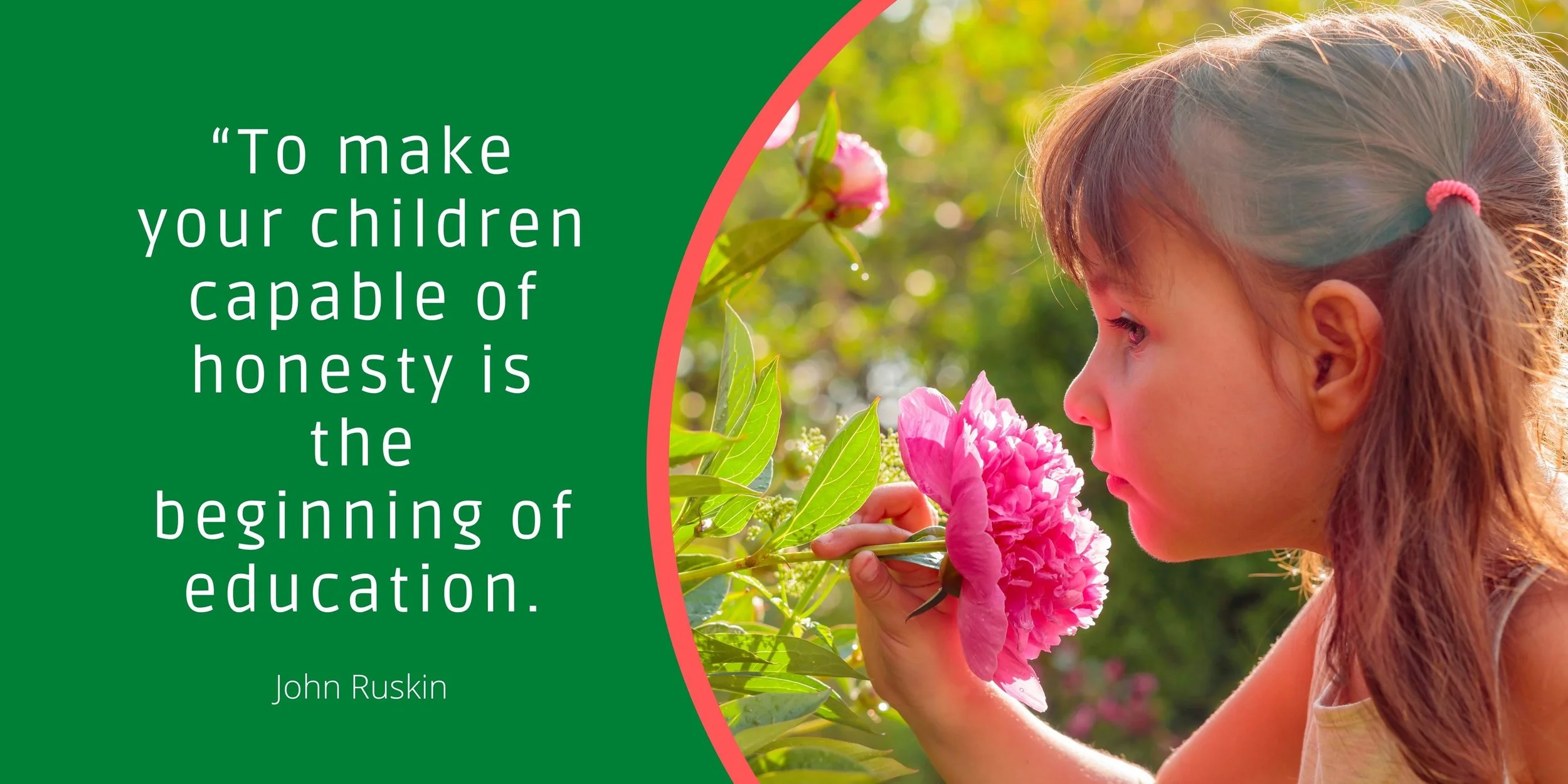How to Teach Your Child to Be Honest All the Time: Parenting Tips, Tricks, and Strategies
Disclaimer: This page contains affiliate links. If you choose to make a purchase after clicking a link, I may receive a small commission at no additional cost to you. Thank You for your support.Honesty is one of the most important character traits that a child can learn. It teaches them to be truthful, trustworthy, and principled.
When children are raised to be honest, they grow into adults who are more likely to have successful relationships and careers.
In this blog post, we will discuss why honesty is so important for kids, and how you can teach them to be truthful from a young age.
We will also offer parenting tips and strategies for dealing with children who lie. Let's get started!
Why Teaching Honesty to Kids is Important?
As the saying goes, honesty is the best policy. But why is teaching honesty to kids so important?
For one thing, honesty is a critical foundation for developing trust. Trust is essential for healthy relationships, both personal and professional.
People who are honest tend to be more reliable and dependable. And when it comes to success in life, dependability is key.
Finally, teaching kids, to be honest, instill in them a sense of integrity. People with integrity are known for being principled and upright.
They have a strong moral character and a deep commitment to doing what is right.
By instilling these values in your children at an early age, you can help them build a foundation for success in all areas of their lives.
Why is Teaching Kids to be Honest so Challenging for Parents?
Teaching young kids to be honest, can be challenging for a few reasons.
Sometimes young kids don't know the true meaning of the words and the lies.
Children love telling tall tales through their imaginations and sometimes find it difficult to distinguish between what they 'wished' happened vs reality
Young children are egocentric, which means they often see things from their own perspective and lack the ability to understand another person's point of view.
As a result, they may not realize why it's important, to tell the truth.
Kids are still learning how to control their emotions and impulses, which can make it difficult for them to resist the temptation to lie.
Children are often afraid of getting in trouble, which can lead them to lie about their mistakes.
They are often still developing their moral compass and may not yet understand the importance of honesty.
While teaching honesty can be challenging, it's important to keep in mind that all children are capable of learning this important character trait.
With patience and consistency, most kids will eventually learn to be truthful.
At What Age Does a Child Know the Difference Between the Truth and a Lie?
Most kids understand the concept of lying by the time they are three or four years old.
However, they may not fully understand why honesty is so important until they are a bit older.
It's important to keep in mind that every child develops at their own pace. Some kids may grasp the concept of honesty sooner than others.
If you have any concerns about your child's development, be sure to seek professional help.
How Do You Explain Honesty to Preschoolers?
When explaining honesty to preschoolers, it's important to keep your explanation simple and age appropriate.
You might say something like, "It's important to always tell the truth because it's the right thing to do.
When you lie, it hurts other people's feelings and makes them not trust you."
It's also important to provide examples of both honesty and dishonesty.
You might say, "For example, it would be honest to tell your friend that you don't want to play with them today.
But it would be dishonest to tell them you're sick when you're not."
Why is Telling the Truth Important for Kids?
Kids need to learn the value of telling the truth for a number of reasons. First, honesty is a cornerstone of good character.
When children are honest, they build trust and respect from those around them.
Honesty leads to self-confidence and self-esteem. Truthful kids feel good about themselves and their abilities.
Here is an article on How To Help Your Child Build Better Self Esteem-7 Best Preschool Activities
Truthful children are more likely to be successful in life. People who consistently lie often find it difficult to maintain relationships and careers.
Honesty is simply the right thing to do. Lying is hurtful and can damage the lives of others. When kids learn to value truthfulness, they set themselves up for a happy and successful future.
What Causes a Child to Lie About Everything?
There are a few different reasons why children might lie about everything.
Sometimes, children lie because they are afraid of getting in trouble.
Other times, they may not understand the importance of honesty and think that it's okay to bend the truth.
And sometimes, children may lie to avoid disappointing others or to make themselves look better.
Parenting Tips and Strategies For Teaching Kids How to Be Honest All the Time
Here are some tips and strategies to help you teach your child honesty:
Role Model Honesty
If you want your child to be honest, you need to role model that behavior yourself.
Be truthful in your own words and actions and avoid white lies.
Here is a helpful article: How To Be A Good Role Model To Kids-15 Characteristics
Encourage Openness.
Create an open and safe environment in your home where your child feels comfortable sharing their thoughts and feelings.
Always try and make yourself available to listen without judgment when your child needs to speak.
This will help them feel more comfortable being honest with you.
Encourage Questions.
Encourage your child to ask questions and be sure to answer them honestly.
This will help them understand that it's okay to seek out the truth or tell the truth even when in a challenging situation.
Explain the Consequences of Lying.
Your child must understand the consequences of lying, like doing additional chores or losing privileges.
Make certain that the consequences are fair and age appropriate.
Keep yourself away from the temptations of imposing harsh punishment as this may damage your parent-child relationship long term.
Practice Calm Discipline
Practice calm discipline when your child lies.
It's important to maintain a calm and level-headed demeanor when dealing with your child's dishonesty.
Getting angry or yelling will only make the situation worse.
Instead, try and have a rational discussion with your child about why telling the truth is so important.
Focus on the Behavior, Not the Child.
When your child lies, it's important to focus on their behavior and not on them as a person.
Remember, children are still learning and growing.
They will make mistakes along the way.
The goal is to help them understand why telling the truth is so important and how they can improve their behavior in the future.
Distinguish the Reason for the Lie
It's important to try and distinguish the reason for the lie.
If your child is lying out of fear, then you'll need to provide reassurance.
If they are lying to avoid disappointing others, then you'll need to help them understand that it's okay, to be honest about their feelings.
And if they are lying to make themselves look better, then you'll need to help them understand the importance of being honest and authentic.
Encourage Healthy Coping Mechanisms.
Help your child become resilient and find healthy ways to cope with difficult emotions like frustration, anger, and disappointment.
For example, you might encourage them to take a few deep breaths or to go for a walk when they're feeling overwhelmed.
This will help them feel better equipped to deal with challenging situations without resorting to lying.
Here is an article on 17 Tips on How to Help Your Child Become More Resilient
Praise Honesty.
When your child is honest, be sure to praise them for their behavior.
This will help reinforce the importance of honesty.
Avoid Labeling
Avoid labeling your child as a "liar" when they do lie.
This can damage their self-esteem and make them more likely to lie in the future.
Don't Ask Questions When You Know the Answer
When you know the answer to a question, don't ask your child if they did something or not.
This will only make them feel like they need to lie to avoid getting in trouble.
Instead, calmly and confidently state what you know to be true.
Allow them an opportunity to tell their side of the story as their reasons or perspectives could be different for their behavior.
Encourage Discussion about Honesty.
Talk to your child about honesty regularly.
This will help children understand why it's important to be truthful.
You might say something like, "I noticed that you didn't tell your sister the truth about taking her toy. What do you think happened because of that?"
Provide Opportunities to Practice Honesty.
Give your child opportunities to practice being honest in everyday situations.
For example, you might say, "I see that you didn't eat your vegetables at dinner. Would you like to tell me the truth about why?”
Be ready to listen to and accept answers like, "I don't like it."
If you think your child has a genuine dislike, then maybe you could compromise and offer choices from 2 other vegetables.
Showing understanding will help build trust and reduce the chances of your child lying.
Make Telling the Truth a Household Rule
Make honesty a household rule that everyone is expected to follow.
This includes you, your partner, and your child.
When everyone is honest, it creates a safe and open environment for your family.
Create a Family Motto about Honesty.
Come up with a short phrase or sentence that everyone in the family agrees to live by.
This could be something like, "In our family, we always tell the truth."
Post it somewhere in your home where everyone can see it as a reminder.’
Be Patient
Parenting is hard work and there are no perfect parents or children.
Be patient with yourself and your child as you both learn and grow together.
Honesty is an important character trait that will help your child succeed in life.
With a little time and effort, you can help your child develop this important skill.
Activities and Games that Help Teach Honesty to Kids
The Truth Tree:
This is a great game for kids of all ages.
Write down different scenarios on pieces of paper and put them in a jar. (You can choose scenarios from children's movies or books that your child is familiar with).
Have your child pick one out and then act out the scenario with them.
After they've had a chance to act it out, discuss with them what the truth was in that situation and how it would have been different if they had lied.
A Day in the Life:
This game is best for kids who are old enough to read and write.
Give them a piece of paper and have them write down what they did during their day, both the truth and any lies they told.
Once they're finished, go over their day with them and talk about why it's important to always tell the truth.
Two Truths and a Lie:
This game can be played with kids of all ages.
Have each person in the family take turns sharing two truths and one lie about themselves.
See if everyone can guess which one is the lie.
Discuss what the lie made you think about the person and why that was not okay.
The Honesty Box:
This is a great game for kids of all ages.
Put different items in a box and have your child pick one out.
They then have to tell you three things about the item.
This teaches kids to pay attention to detail and retell the information accurately.
Hot or Cold:
This is a great game for younger kids.
One person will hide an object while the other people in the family try to find it. The person who is hiding the object can give clues by saying if the guess is "hot" or "cold."
As the game progresses, the clues should get more specific so that the object can be found.
This game teaches kids that it's important to give accurate information.
I Spy:
This is another great game for younger kids.
One person will choose an object and then say, "I spy with my little eye something that is (color)."
The other people in the family then have to guess what the object is.
This game also teaches kids the importance of giving accurate information.
Conclusion
Honesty is one of the most important character traits a child can possess.
Not only does it make them more trustworthy, but it also teaches them to have integrity and be truthful in all aspects of their lives.
Teaching your child to be honest all the time can be a challenge, but with patience and perseverance, it is achievable.
We hope our tips and tricks will help you achieve this goal and that you will share your experiences with us as well.
What has worked best for you when teaching your child honesty?
Let me know what you think!
FAQ
Q: How do I teach my child to stop lying?
A: As a parent, there are a few things you can do to encourage honesty.
First, avoid reacting negatively when your child tells a lie. This will only reinforce the behavior. Instead, calmly explain why telling the truth is important. You can also provide incentives for honesty, such as praise or rewards. Finally, be sure to set a good example by being honest. By taking these steps, you can help your child learn the value of truthfulness.
Q: Why does my child keep lying?
A: There are a few possible reasons why your child may keep lying. It could be that they're trying to avoid getting in trouble or that they don't think telling the truth is important. It's also possible that they're simply repeating what they see adults do. To teach children how to be honest, follow the Parenting Tips and Strategies in this blog post.













